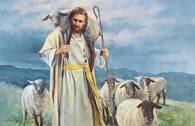
When I was in college at the University of Illinois (some referred to the university as U of I or “Ewe of Eye”) I spent a semester living at the University’s sheep barn. This was not because I had trouble sleeping and needed a place to conveniently count sheep. I was trying to get experience with a variety of animal species so that I had a better chance of being accepted into veterinary school. The shepherd of the flock was from Massachusetts and had a heavy New England accent. As such, he referred to his job as being a “Baa Tenda”.
My job at the barn was to get up during the night and walk in the barn looking for ewes (female sheep) that were in the process of giving birth (lambing) to see if they were having difficulty. If so, I was to assist in getting the lamb or lambs out and get them in a comfortable spot as well as being sure they could nurse. I want to point out here that this was in February…in Illinois…in the cold…at night. I had been SLEEPING!! What I am getting at is that I did not always do the best job of investigating for troubled Mothers and occasionally the Baa Tenda would find some issues in the morning that I had missed the night before. Needless to say, I was not a very good shepherd. Though I did excel at getting Egg McMuffin sandwiches from McDonald’s for everyone for breakfast. I think this is why I kept my job.
So what does a shepherd really do anyway? Since I obviously didn’t have a clue based on my performance in college, I looked up the duties of a shepherd. I discovered 4 main functions: 1) protect the flock from predators 2) Ensure the overall safety and welfare of the flock 3) Lead the flock to productive grazing areas 4) avoid poisonous plants. Even when you are tired, cold and would rather stay in bed. Not only do bad shepherds not attend to their sheep sufficiently, some also fed themselves before taking care of their sheep. Remember the definition of love? Putting the needs of others before yourself. Good shepherds LOVE their sheep by putting their welfare ahead of their own.
No wonder Jesus was described as the Good Shepherd. The people could identify with this analogy and also recognize that it was Jesus’ love for them that led him to lay down his life for them. As all good shepherds would do. But not only did Jesus do this. So did his apostles. Remember how he sent them out in groups of two in order to spread the Gospel all around the region? How they cared for the churches that were established after Jesus’ ascension? But also recall what happened to the disciples right after Jesus was crucified. When they lost their shepherd. They were scattered and hid in fear. Apparently, the Romans understood this well since they knew that during military battles, a goal is to eliminate the leadership (the generals, colonels, etc) since this can result in chaos among the remaining troops.
In the Old Testament it would appear that Jesus as the good shepherd was foretold in Moses’s prayer in Numbers 27, in which he asks God to appoint his successor. Someone “who shall go out before them and come in before them, who shall lead them out and bring them in, so that the congregation of the Lord may not be like sheep without a shepherd” (Numbers 27:17).
How did Jesus fulfill this role? In casting out demons, he was protecting the people from predators and preserving their safety and welfare. He ensured their nourishment by feeding them with the word of God and avoiding the poisonous plants of sin. He actually led the people by instructing them and also admonishing them when their behavior was not in line with God’s teachings. And He asked His disciples to do the same. To be shepherds to God’s flock. To spread His word as food for the soul, to avoid the perils of sin and to put the lives of others first before their own needs. They too would lay down their lives for their friends.
But, like the apostles in Jesus’ time, we succeed and we also fall short. We want to sleep in. We would rather stay warm. Not go out to the barn in 20 degree weather. But the reward for making these sacrifices is that, when we do put the flock first, we all wind up in greener pastures. Where the sun shines its warmth, where the grass is tall and lush. And where the true Shepherd can take over from us and lead the flock home.
